Couples battle Desert sand to help highway
Updated: 2016-10-28 11:44
By Xinhua in Urumqi(China Daily USA)
|
|||||||||
One man says living in the wilderness, with no one else around, has brought him and his wife closer together
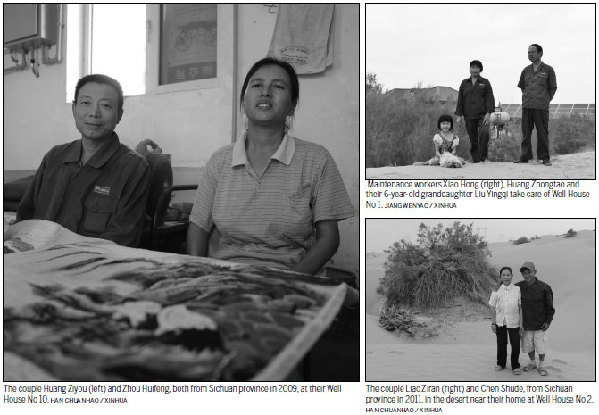
The desert is still quiet at 8 am, but Xiao Hong and his wife, Huang Zhongtao, have already started the water pump to irrigate this dry stretch of earth. Deep in the Xinjiang Uygur autonomous region, the Taklamakan Desert is known in China as the "Sea of Death". In the Uygur language, its name means "go in and you won't come out".
Xiao and Huang, maintenance workers at Well House No 1, are among nearly 100 couples who tend to plants year-round along the Taklamakan Desert Highway to prevent the shifting sand from burying the key cross-desert artery.
Sand and survival
When construction on the highway was completed in 1995, reed grids and fences were installed along uninhabited stretches of the highway to hold the sand in place. However, as the years passed, most of the grids and fences started to fail, exposing the highway to dangerous shifting dunes.
Starting in 2003, 109 wells were dug along the highway every 4 km to pump water for bushes and other vegetation to block the wind and keep the sand in place.
The well houses became the key to survival for the 3,000-hectare "green corridor".
By the time Huang and Xiao finished inspecting the pipes and plants, it was already past 10 am. Xiao wrote down notes about irrigation and water volume in a logbook, while Huang prepared breakfast.
The couple live in a 10-square-meter bungalow adjacent to the noisy generator and pump room.
According to Xiao's logbook, sandstorms and rain have been more frequent this year than before. That means more mosquitoes.
"Desert mosquitoes are much fiercer", said Huang, pointing at the empty cans of insecticide that fill the windowsill. "Even house flies here can bite the skin until it bleeds."
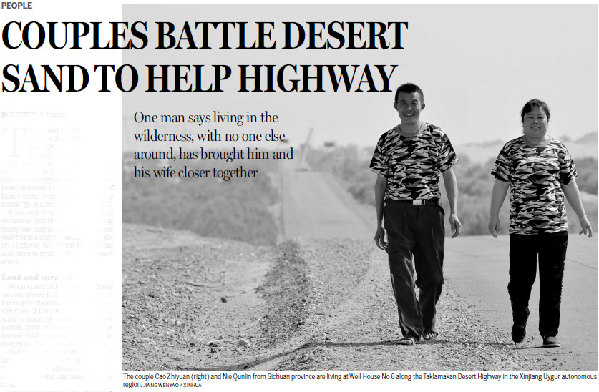
Tough journeys
Mosquitoes have never been a primary concern for Zheng Xinxue and Li Juying at Well House No 30. Their thoughts are with their grandchildren in the central province of Henan, about 3,000 km away.
Zheng and Li, both in their 60s, glance at a cellphone displaying the smiling faces of their grandson and granddaughter whenever they miss the children.
Li said they will ask for leave next month, when irrigation stops due to the cold. Their trip home will take several days. Li recalled a previous trip, when her feet were swollen after sitting on a train for days.
"I definitely still want to go back," she said.
Zeng Dezhang and Wang Huirong at Well House No 8 are experts in tough journeys. The couple from the southwestern province of Sichuan have been stationed here since 2006. Their son last came to visit four years ago.
Last year, before Spring Festival, they hitchhiked to the nearest town, several hundred km away, before they could catch a bus to a train station in the southern Xinjiang city of Korla. From there, they took a train to the northwest province of Shaanxi and transferred to another train headed south to Chengdu, capital of Sichuan.
But it was not over. They still had to take a bus to their hometown in Weiyuan county. Four days of their precious holiday had been spent on the road, and another four days would be needed for the return trip.
"We miss home, but the trip has scared us off almost every year," said Li, 52, as a dog followed her like a shadow.
Of all the couples, Huang Xiaobing and Zhou Sixiu at Well House No 35 have endured the desert's sandstorms and isolation the longest. The two have hardly bickered since they arrived more than a decade ago. Huang, the husband, has worked diligently, while Zhou has run the home with love and patience.
"Our feelings toward each other deepen with no one else around," Huang said. "Growing old with each other is the most romantic thing I can think of."
Aside from a supply truck that comes to their doorstep every 10 days, the well houses are like solitary planets, most with only two inhabitants.
In Well House No 35-1, Bai Qianli is all alone.
She followed her husband to the desert in 2011, but he left to work elsewhere. She has stayed for another three years since then.
"Sometimes I cannot find anyone to talk to for almost a week, so I run deep into the desert and scream," Bai said. "This job cultivates one's mind and spirit, and my temperament has gotten better."
She said this year's sacsaoul, a bush that anchors the sand with its roots, has thrived. "Look at this one. It has grown at least 30 cm since spring. It's now taller than I am."
As the sun dropped behind the horizon, she shut off the generator and the pump. The place suddenly fell dark.
Night crept over the desert. Bai said she is not afraid, because she knows the sacsaoul has been cared for and will continue to grow as she sleeps.
- Hefty award offered for deciphering oracle bone characters
- China Daily brings you 'sixth plenums' in past 35 years
- Party ramps up supervision
- 400,000 migrant workers flock to Xinjiang to harvest cotton
- China anticipates booming job market in 2016
- Online shopping platform selects cat as 'chief cute officer'
- Asia American leaders discuss civic engagement
- World's disabled get new champion
- Clinton, Michelle Obama make first joint campaign appearance
- Miss Philippines wins 2016 Miss International Beauty Pageant
- Trump's Hollywood Walk of Fame star destroyed
- Maduro activates Defense Council to seek solution to crisis

 China-Russia Internet Media Forum opens in Guangzhou
China-Russia Internet Media Forum opens in Guangzhou
 2016 Comedy Wildlife Photography Awards Finalists
2016 Comedy Wildlife Photography Awards Finalists
 NINED VR creates splash with virtual reality products
NINED VR creates splash with virtual reality products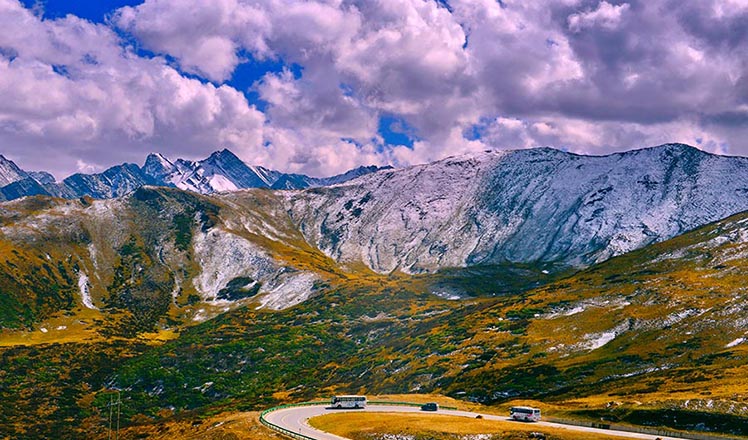
 Splendid Sichuan captured in photos
Splendid Sichuan captured in photos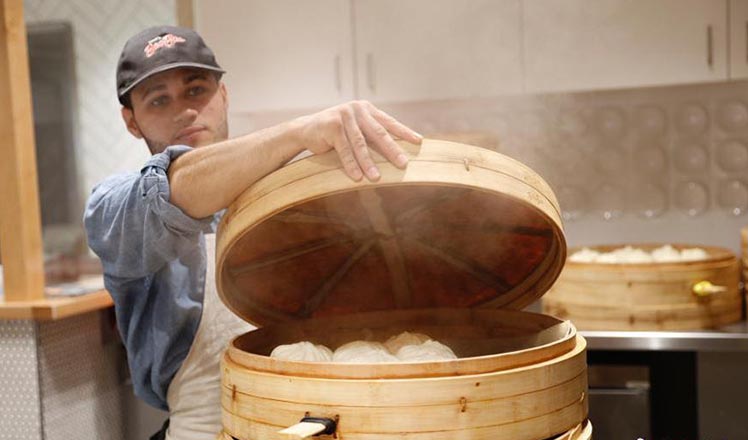
 Chinese baozi shop gains popularity in Harvard Square
Chinese baozi shop gains popularity in Harvard Square
 Chinese mariner on record-breaking voyage goes missing
Chinese mariner on record-breaking voyage goes missing
 2045-square-meter photo mosaic breaks world record
2045-square-meter photo mosaic breaks world record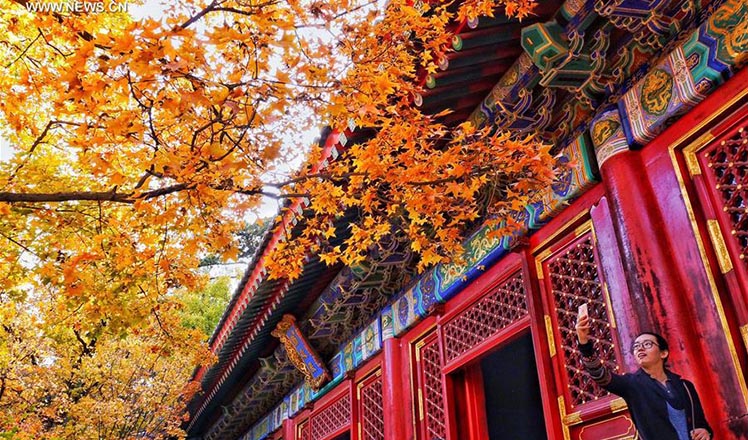
 Red leaves reveal beauty of autumn
Red leaves reveal beauty of autumn
Most Viewed
Editor's Picks

|

|

|

|

|

|
Today's Top News
'Zero Hunger Run' held in Rome
Trump outlines anti-terror plan, proposing extreme vetting for immigrants
Phelps puts spotlight on cupping
US launches airstrikes against IS targets in Libya's Sirte
Ministry slams US-Korean THAAD deployment
Two police officers shot at protest in Dallas
Abe's blame game reveals his policies failing to get results
Ending wildlife trafficking must be policy priority in Asia
US Weekly

|

|









